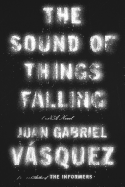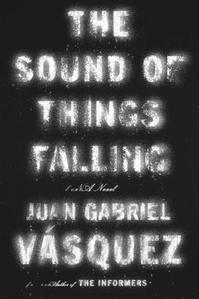

Juan Gabriel Vasquez uses this history as a backdrop in The Sound of Things Falling, as he tries to come to terms with years of drug-related violence that many Colombians would rather forget. For Vasquez and his narrator, young attorney and teacher Antonio Yammara, these bygone events have been formative, leaving a legacy of fear.
The novel begins in 2009 with the killing of a hippo that escaped from what was the private zoo on Escobar's estate. When Yammara reads of this, he is besieged by memories of the mid-1990s, starting with a casual encounter in a Bogotá billiard parlor. Antonio develops a sort of friendship with Ricardo Laverde despite his secretiveness; then, one day, Laverde is murdered on the street. Who killed him and why? Yammara, who was also wounded in the attack, is compelled to find out Laverde's story and, in the process, sees his own life fall apart. He discovers that Laverde was a pilot and drug trafficker, a mule for Escobar and his henchmen.
There are several references to rising and falling--metaphors for the way the past has an impact on the present, causing lives to crash or implode. Two plane crashes take place in the narrative: one during an aerial stunt many years before and the crash that takes the life of Elaine Fritts, Ricardo's estranged wife, who was returning to Bogotá to join him. Before the plane crashes, the pilot is heard on the black box repeating, "Up, up, up."
Yammara's obsession with Ricardo leads him to Maya Laverde, his 28-year-old daughter, who believed that her father was dead many years before he was murdered. She, too, has been damaged by a past whose events she did not participate in. She and Antonio share this bond, one which challenges his shaky marriage.
Vasquez examines, eloquently, how memories can cripple and heal at the same time, how the past must be exorcised before a real future is viable. --Valerie Ryan
Shelf Talker: In a story beautifully told--and masterfully translated by Anne McLean--Vasquez explores the impact that an unexamined past has on the present.

